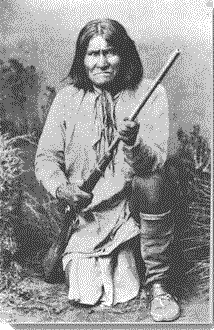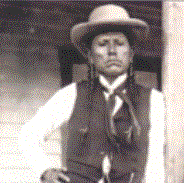| As leader of the Apache Indians in Southwestern
United States, he made a record of ferocity and tenacity seldom equaled
in the Indian wars. Out manned and outgunned, he was able to outmaneuver
all of the troops sent after him.
Geronimo believed in the old adage of "he,
who fights and runs away, lives to fight another day," and that is the
tactic by which his small group of Apache warriors was able to harass such
a large area of the Southwest. They would strike and then fade into the
mountainous country, making their next foray miles from the last one. Geronimo
was captured several times, but always escaped and resumed his wild life.
He finally surrendered at Camp Bowie, Arizona, on September 4, 1886. At
the end there were some five thousand troops after a band of thirty six
Apaches, including men, women, and children.
As a prisoner of war, Geronimo and other Apaches
were sent to Fort Pickens, Pensacola, Florida; then to Mount Vernon, Alabama;
and finally to Fort Sill, Oklahoma, where he died from pneumonia on February
17, 1909. He is buried at the fort.
Geronimo was an attraction to the numerous
visitors at Fort Sill. He was converted to Christianity in 1903. He went
to Washington, D.C., in 1905, and was a conspicuous part of the inaugural
procession of President Theodore Roosevelt.
Geronimo was an able speaker and the
talk given here was at a conference held March 25, 1886, at the Canon of
the Funnels, near San Bernardino Springs, New Mexico, where General George
Crook was attempting to deal with the Chiricabua Apache chieftains. Geronimo
was trying to impress Crook with his good intentions.
I want to talk first of the causes which led
me to leave the reservation. I was living quietly and contented, doing
and thinking of no harm, while at the Sierra Blanca. I don't know what
harm I did to those three men, Chato, Mickey Free, and Lieutenant Davis.
I was living peaceably and satisfied when people began to speak badly of
me. I should be glad to know who started those stories. I was living peaceably
with my family, having plenty to eat, sleeping well, taking care of my
people, and perfectly contented. I don't know where those bad stories first
came from. There we were doing well and my people well. I was behaving
well. I hadn't killed a horse or man, American or Indian. I don't know
what was the matter with the people in charge of us. They knew this to
be so, and yet they said I was a bad man and the worst man there; but what
harm had I done? I was living peaceably and well, but I did not leave on
my own accord. Had I left it would have been right to blame me; but as
it is, blame those men who started this talk about me.
Some time before I left an Indian named Wodiskay
had a talk with me. He said, "they are going to arrest you." I paid no
attention to him, knowing that I had done no wrong; and the wife of Mangus,
"Huera," told me that they were going to seize me and put me and Mangus
in the guard-house. I had also learned from the American and Apache soldiers,
from Chato, and Mickey Free, that the
Americans were going to arrest me and hang
me, and so I left.
I would like to know now whom it was that gave
the order to arrest me and hang me. I was living peaceably there with my
family under the shade of the trees, doing just what General Crook had
told me I must do and trying to follow his advice. I want to know now who
it was ordered me to be arrested. I was praying to the light and to the
darkness, to God and to the sun, to let me live quietly with my family.
I don't know what the reason was that people should speak badly of me.
I don't want to be blamed. The fault was not mine. Blame those three men.
With them is the fault, and find out who it was that began that bad talk
about me.
I have several times asked for peace, but trouble
has come from the agents and interpreters. I don't want what has passed
to happen again. Now, I am going to tell you something else. The Earth
Mother is listening to me and I hope that all may be so arranged that from
now on there shall be no trouble and that we shall always have peace. Whenever
we see you coming to where we are, we think it is God you must come always
with God. From this on I do not want that anything shall be told you about
me even in joke. Whenever I have broken out, it was always been on account
of bad talk. From this on I hope that people will tell me nothing but the
truth. From this on I want to do what is right and nothing else and I do
not want you to believe any bad papers about me. I want the papers sent
you to tell the truth about me, because I want to do what is right. Very
often there are stories in the newspapers that I am to be hanged. I don't
want that any more. When a man tries to do right, such stories ought not
to be put in the newspapers.
There are very few of my men left now. They
have done some bad things but I want them all rubbed out now and let us
never speak of them again. There are very few of us left. We think of our
relations, brothers, brothers-in-law, father-in-law, etc., over on the
reservation, and from this on we want to live at peace just as they are
doing, and to behave as they are behaving. Some-times a man does something
and men are sent out to bring in his head. I don't want such things to
happen to us. I don't want that we should be killing each other.
What is the matter that you don't speak to
me? It would be better if you would speak to me and look with a pleasant
face. It would make better feeling. I would be glad if you did. I'd be
better satisfied if you would talk to me once in a while. Why don't you
look at me and smile at me? I am the same man; I have the same feet, legs,
and hands, and the sun looks down on me a complete man. I want you to look
and smile at me.
I have not forgotten what you told me, although
a long time has passed. I keep it in my memory. I am a complete man. Nothing
has gone from my body. From here on I want to live at peace. Don't believe
any bad talk you hear about me. The agents and the interpreter hear that
somebody has done wrong, and they blame it all on me. Don't believe what
they say. I don't want any of this bad talk in the future. I don't want
those men who talked this way about me to be my agents any more. I want
good men to be my agents and interpreters, people who will talk right.
I want this peace to be legal and good. Whenever I meet you I talk good
to you, and you to me, and peace is soon established; but when you go to
the reservation you put agents and interpreters over us who do bad things.
Perhaps they don't mind what you tell them, because I do not believe you
would tell them to do bad things to us. In the future we don't want these
bad men to be allowed near where we are to live. We don't want any more
of that kind of bad talk. I don't want any man who will talk bad about
me, and tell lies, to be there, because I am going to try and live well
and peaceably. I want to have a good man put over me.
While living I want to live well. I know I
have to die some time, but even if the heavens were to fall on me, I want
to do what is right. I think I am a good man, but in the papers all over
the world they say I am a bad man; but it is a bad thing to say so about
me. I never do wrong without a cause. Every day I am thinking, how am I
to talk to you to make you believe what I say; and, I think, too, that
you are thinking of what you are to say to me. There is one God looking
down on us all. We are all children of the one God. God is listening to
me. The sun, the darkness, the winds, are all listening to what we now
say.
To prove to you that I am telling you the truth,
remember I sent you word that I would come from a place far away to speak
to you here and you see us now. Some have come on horseback and some on
foot. If I were thinking bad, or if I had done bad, I would never have
come here. If it has been my fault, would I have come so far to talk to
you? I have told you all that has happened. I also had feared that I should
never see Ka-e-te-na again, but here he is, and I want the past to be buried.
I am glad to see Ka-e-te-na. I was afraid I should never see him again.
That was one reason, too, why I left. I wish that Ka-e-te-na would be returned
to us to live with his family. I now believe what I was told. Now I believe
that all told me is true, because I see Ka-e-te-na again. I am glad to
see him again, as I was told I should. We are all glad. My body feels good
because I see Ka-e-te-na, and my breathing is good. Now I can eat well,
drink well, sleep well, and be glad. I can go everywhere with good feeling.
Now, what I want is peace in good faith. Both you and I think well and
think alike.
Well, we have talked enough and set here long
enough. I may have forgotten something, but if I remember it, I will tell
you of it tonight, or tomorrow, or some other time. I have finished for
today, but I'll have something more to say bye and bye. |











